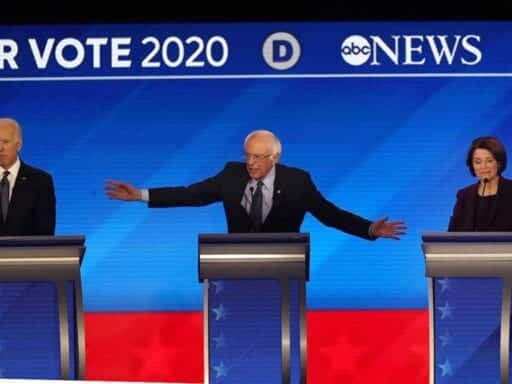What happens in Las Vegas … could have implications for the Democratic primary.
With early voting already underway in Nevada and the primary race still fluid, there could be more than a few fireworks when 2020 Democrats take the debate stage again.
The ninth Democratic debate of the primary takes place this Wednesday, February 19, at 9 pm ET at the Paris Theater in Las Vegas. It will be hosted by NBC News, MSNBC, Noticias Telemundo, and the Nevada Independent, and will be moderated by a panel of five journalists from those outlets.
This will be the third 2020 debate hosted by NBC. It will be available to stream live on the NBC and MSNBC websites, as well as from Noticias Telemundo and the Nevada Independent.
The debate, which is expected to last about two hours, will be a chance for the six Democratic candidates set to appear on stage to make their final case to voters before the Nevada caucuses this Saturday, February 22.
Those six candidates are:
- Former Vice President Joe Biden
- Former New York City Mayor Michael Bloomberg
- Former South Bend, Indiana, Mayor Pete Buttigieg
- Sen. Amy Klobuchar
- Sen. Bernie Sanders
- Sen. Elizabeth Warren
There are also two candidates still in the race who won’t be on stage: California billionaire Tom Steyer and Hawaii Rep. Tulsi Gabbard.
Every candidate to qualify except Bloomberg was also on stage for the eighth primary debate in Manchester, New Hampshire, earlier this month; Bloomberg qualified for the Las Vegas debate after the Democratic National Committee revised the debate criteria last month — a move that prompted some consternation from the rest of the field.
The new criteria gave candidates two paths to the stage: delegates or polling. Candidates had to either earn at least one pledged delegate to the Democratic National Convention out of Iowa or New Hampshire, or achieve at least 10 percent in four qualifying national polls or 12 percent in two qualifying early-state polls to qualify for the debate.
That sets up an interesting dynamic: Bloomberg is the only candidate who has yet to appear on a ballot or the stage, but he’s on the rise in national polls. That could be an incentive for other candidates to take aim at him on Wednesday — but if the recent New Hampshire debate is any model, they’ll also be looking to land a hit on rivals who performed well in the first two states to vote.
The state of the race, briefly explained
Sanders is ascendant: After a win in New Hampshire and a close-run second-place finish in Iowa, the Vermont senator has cemented his status as frontrunner for the Democratic nomination for president and in Nevada. Sander is leading in the RealClearPolitics national polling average by almost 8 points, and he has a 14-point lead in the Nevada average (albeit with limited polling in the state). Politico reported Monday that advisers for at least three campaigns have already acquiesced to a Sanders win in Nevada and are instead playing for second and third place.
Bloomberg is a question mark: The New York billionaire has climbed to second place in recent national polls of the Democratic primary on the strength of more than $400 million in ad spending (and some honeyed brie). He hasn’t, however, been on a debate stage yet, and how he’ll perform Wednesday night is a mystery. He’s likely to be the subject of intense scrutiny over old comments about stop-and-frisk policing, redlining, and a slew of other topics. If Wednesday night goes poorly for Bloomberg, though, he has time to bounce back — his name won’t appear on a ballot until Super Tuesday on March 3.
Candidates face a more diverse electorate: Unlike Iowa and New Hampshire — two of the whitest states in the country — Nevada is quite diverse. For several candidates — notably Buttigieg and Klobuchar — that could pose a problem. Both have done well in the first two primary states, but in a recent NPR/PBS NewsHour/Marist poll, Klobuchar registered at 3 percent with African American voters, and Buttigieg did only slightly better at 4 percent. If either candidate wants to have a real shot at the nomination, they’ll need to show strength with voters of color down the stretch; Nevada will be a test of their ability to do so.
Author: Cameron Peters
Read More



